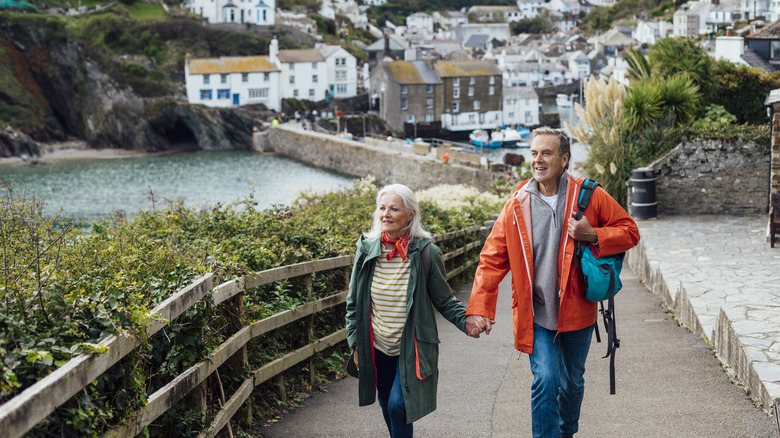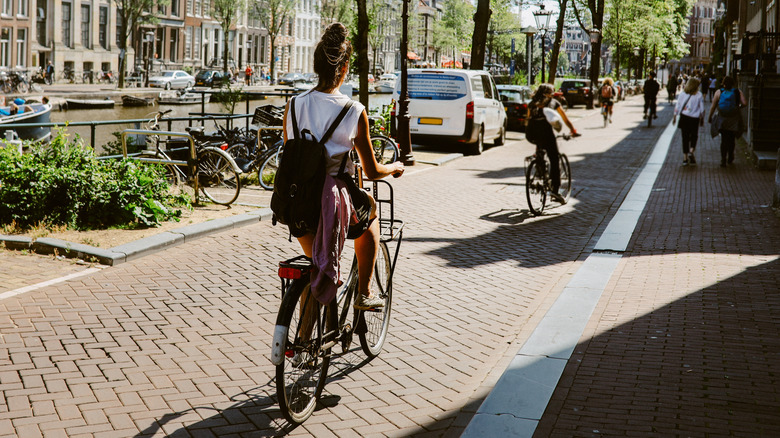Rick Steves' Top Tips For Eco-Friendly Travel
According to a 2023 survey by The Vacationer, a whopping 82% of Americans believe sustainable travel is important. That's over 200 million of us who actively care about the environment. However, the same survey showed that less than 5% of respondents considered sustainability the most important factor when planning travel. Unsurprisingly, for almost 60%, it's all about cost. Luckily, Rick Steves' best tips for eco-friendly travel are totally free and can actually save you money.
The European travel expert, who has published over 50 best-selling guidebooks, asserts that as travelers, we have a responsibility to do what we can to minimize our carbon footprint. Steves doesn't just talk the talk either. His company, Rick Steves' Europe, imposed a carbon tax on itself completely voluntarily, pledging to invest $30 per traveler on their tours into climate-friendly projects in the developing world. But his tips are on a much smaller scale and they begin at home.
Consider how you're leaving your home
One of Rick Steves' biggest tips for people wanting to travel in a more eco-friendly way is to focus not solely on the destination but on our own houses, too. Before you jet off anywhere, Steves recommends turning down the thermostat. If it's going to be cold while you're on vacation, many experts suggest setting your thermostat to around 55 degrees Fahrenheit. If you're going away in the summer, turn your thermostat up instead — 85 degrees Fahrenheit is a reasonable temperature to keep mold at bay while still maintaining a relatively cool inside temperature.
You should also unplug electrical appliances where possible. Home entertainment systems, computers, and kitchen appliances should all be unplugged. If your water heater has a vacation mode, switch it on. However, you should leave your Wi-Fi on along with any smart home devices that could help with security. Steves also advises canceling any print subscriptions you receive. Additionally, make sure you stop any regular food deliveries (milk or other perishable items, especially). All of these tips help you travel more sustainably while also saving you money, too.
Eco-friendly travel doesn't have to be complicated
Your hotel is your new home while on vacation, so Rick Steves advises paying attention to how much energy you're wasting there too. When you leave the room, turn off all lights and the air-conditioning. You don't need to think about this in most of Europe and Asia, thankfully. The electricity in your hotel room is usually turned on when you insert your keycard into a slot by the door. Take your keycard out to leave the room, and voilà! The electricity is off. If you're in private accommodation, do your due diligence before you go.
The travel expert also suggests not having your towels changed daily to save water and electricity used for washing. One way to do this is to put the "Do not disturb" sign on your door. However, if you want your trash emptied or your room made up or cleaned, hanging your towels up is usually a signal that you don't want them changed. Otherwise, leave them on the floor if you do. Finally, Steves flags transportation. His preferred method for getting around European cities is by using leg power wherever possible, weather permitting.
Biking and walking have no negative impact on the environment and are often the fastest ways to cover short distances. Europe's cities tend to be covered in bike lanes, making cycling safe even for the wobbliest riders. Another option is to take public transport, which is typically extensive in European towns and cities, including from the airport to the downtown area. As a bonus, these methods are much cheaper than private transportation.


